

The Family Transition Project supports individuals and families who want to explore the possibilities of community life, for those currently living in large institutions. Hope is at the heart of the Family Transition Project. We offer resources, advocacy, and encouragement through our unique lens of personal experience to people with intellectual/developmental disabilities (I/DD) and their families who are in the process of transitioning from institutional to community living or just considering a transition. We share our own transition success stories and those of loved ones and many other FTP families.
Family Transition Project Mentors are a group of six self-advocates who have lived in state operated institutions and can speak personally to the challenges and benefits of transitioning to the community. They will engage one on one with individuals with I/DD and their families or address large groups.
We know that transitions are all different and people face different barriers, so we offer a listening ear and compassionate support to individuals and their families. We share choices that have worked, but don’t prescribe cookie cutter solutions. We are here to support individuals and families as they work towards their own specific goals.

Family advocates meet one on one with self-advocates and their families by phone, email, or in person – whatever is most helpful. We are here to listen and learn their histories, their needs, and their concerns.
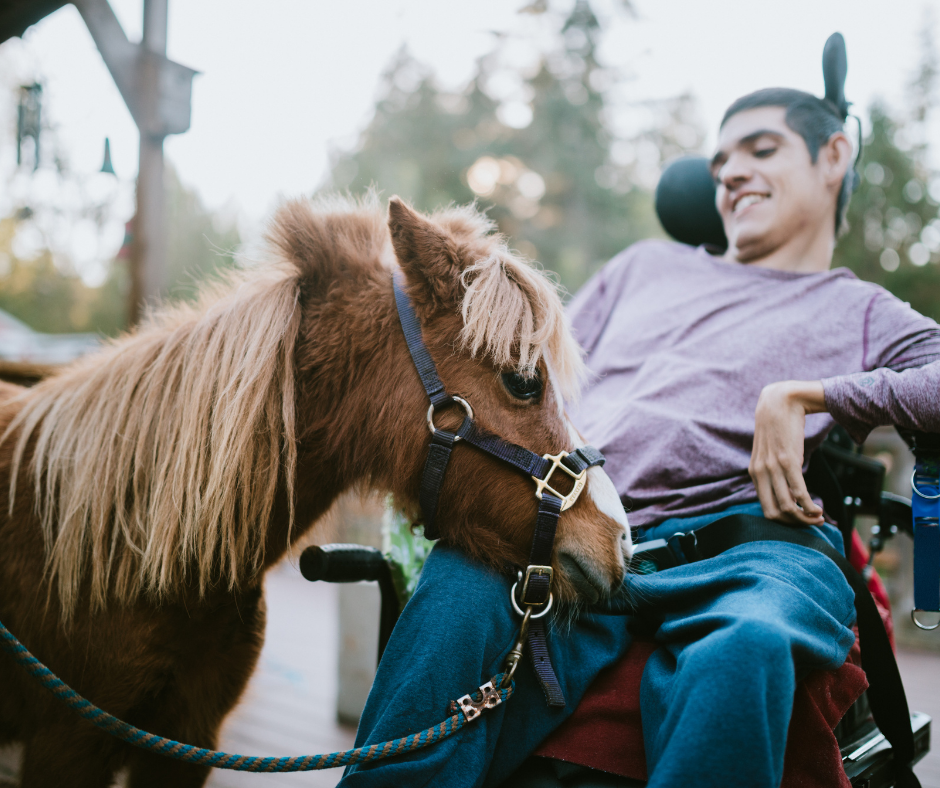

Greg is an accomplished Operations Manager with 35+ years of experience in nonprofit leadership and program development, particularly as it relates to adults with intellectual and developmental disabilities. Greg’s experience ranges from direct, hands-on training in life skills enrichment programs to managing supports for over 400+ people with IDD across four divisions, four congregate work sites, and over 20 community-integrated living arrangements.
Importantly, Greg has a very unique relationship to his work that drives his passion for advocacy. As a father of an adult child who has physical and intellectual disabilities resulting in high support needs, Greg truly understands the value of maximizing the quality of life through community involvement for people he supports by providing them with the necessary support structures to lead dignified and fulfilling lives.
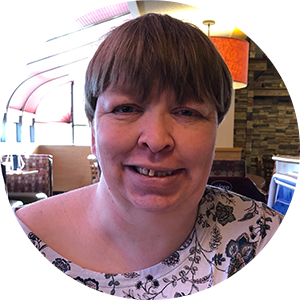
Sue O’Connor has lived in Shapiro Developmental Center in Kankakee, Illinois, and now lives in a CILA home of her choice in Park Forest. Sue loves talking to people and takes the opportunity to politely educate people who ask her in public settings if she has a disability. She makes friends wherever she goes. She has overcome her shyness to speak up for people with disabilities on numerous occasions, for organizations like The Alliance and The Arc of Illinois as well as for friends who request her help. With the support of her family and guardian she has successfully advocated for the home and daily activities she has always dreamed of, including plans to volunteer at a nursing home. Sue loves her friends and family, pizza, dogs, shopping, eating out, and traveling, as well as her advocacy work. She continues to think of new advocacy projects. Quote, “All institutions need to be shut down.”
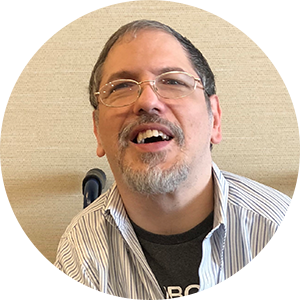
Bob Peterson is well known in Illinois disability circles as a seasoned and impassioned advocate for community living. Many don’t know that he lived for several years at Shapiro Developmental Center in Kankakee. He served 9 years on the board of The Arc of Illinois, is now an Arc Mentor, and is an officer for the Arc’s National Council for Self-Advocacy. He has been involved with many advocacy organizations including Partners in Policymaking, The Self Advocacy Alliance, the Going Home Coalition, SABE, and UIC. He has served on advisory committees, testified at hearings, and spoken at rallies and press conferences. He can be found at numerous events talking to legislators and other movers and shakers in the disability field. Bob has been interviewed, quoted, recorded, and filmed by a number of Media outlets. Bob likes movies, eating out, socializing with friends, time on his computer, and always advocating! Because he uses a wheelchair, transportation takes planning, but as he pointed out, “I didn’t have to worry about PACE when I was living in an institution because I didn’t go anywhere!”
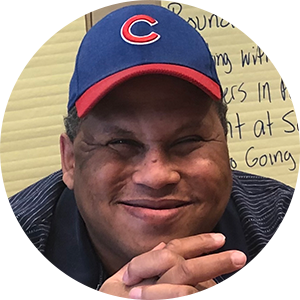
John Porter is an experienced and skillful advocate for himself and others. He spent six and a half years at Howe Center in Tinley Park, Illinois, in what was supposed to be a temporary stay. Now he lives in a CILA of his choice in Pontiac, Illinois, closer to family and friends. He has made job and home changes since Howe, as he has advocated for what he wants and needs. The latest transition is to apartment living. He has many friends in the disability field and he knows who to call! He is proud of his years of affiliation with People First, the Arc of Illinois Mentor Program, and the Illinois Council on Developmental Disabilities, where he now serves on the board. John enjoys going out, all sports, keeping up with the news and social media, and phone conversations with friends near and far. John would like to see funding shift from institutions to services in the community.
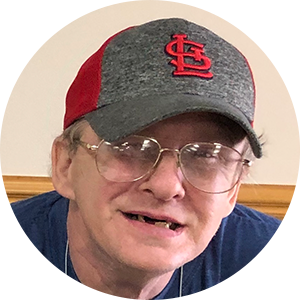
Robert Rowley grew up on a farm in northern Illinois and still remembers driving a tractor. He has lived at both the Singer Center in Rockford and the Murray Center in Centralia. For the last nine years he has lived in a CILA home in Marion, Illinois. His room is all his own, decorated with purchases from work earnings. A few of his favorite things are Cardinals memorabilia, his collection of baseball caps, and his large flat screen TV and comfortable chair. Although he has started to use a walker for balance, he still works in recycling, shops for himself, does his own laundry, and socializes with his girlfriend. He bowls, attends baseball games (usually The Miners), eats out, and attends weekly church gatherings. He is justly proud of the fact that he quit smoking since he moved out of Murray and has kept on track. What does he like about community living? “I can go more places and do more things.”

Hector Renta has lived in a number of different institutions in Illinois over the years, including Howe Center in Tinley Park, which is now closed. He remembers a time long ago when he was locked in a room, homesick, and punching the walls. He changed his attitude and found strength in his faith and in helping others. Since then Hector is living a completely different life where he is an included and valued member of his community. He shares a group home with seven other people, works in a grocery store and in a restaurant where he washes dishes and buses tables. He’s active in a number of organizations and loves to sing and dance. His favorite food – rice and beans. Favorite drink – coffee. He is engaged and loves spending time with his fiancée and family and friends. One of the things Hector enjoys sharing with people is his positive attitude. He listed “helping others and helping myself to achieve my goals” as two of his hobbies. He has worked in a daycare center and volunteered for a thrift store. In a previous home, Hector saved a housemate’s life with the Heimlich maneuver. He has been honored for his achievements and received IARF’s Barbara Bishop Award. Quote: “People with disabilities should get a chance to express themselves and to reach their goals.”

James is a man with a lot of enthusiasm for life. He was born in Chicago and has lived a number of different places, including the Elizabeth Ludeman Center in Park Forest, one of the seven state operated developmental centers left in Illinois. James now enjoys his CILA home in Chicago, which he shares with five other men.
If you ask James what he likes to do, you’re going to get a big list. He puts together puzzles with 1,000 pieces and hopes to get up to 3,000 pieces. He has been known to frame puzzles to hang up or to give away. He enjoys coloring and other forms of art, particularly coloring pictures of butterflies, horses, and sports scenes. He loves movies and prefers action, horror, and comedy, which he watches on his smart TV. He loves sports – particularly basketball, football, and baseball. He has been on a championship team and won a trophy. James plays all kinds of games, from Uno to chess. He likes animals and would love to volunteer at a pet shelter. James enjoys going out and about in the community and doing fun activities. He uses public transit and has great skill at navigating the city. His favorite color is blue. Favorite foods – pizza, burritos, slushies, and iced coffee.
Recently, James participated in a fashion show sponsored by his service provider, Envision Unlimited, and his outfit was called, “Dressed for Success.” James has success written all over him! He loves to work and pre-pandemic did warehouse and cleaning jobs. He plans to resume work as soon as his day program finishes relocating.
Quote: “I like living in the community and I like my job.”
Each SODC assists individuals who would like to live in the community to find a provider that will help them fulfill their wants and needs. This is done through person centered planning with their Individual Support Team in conjunction with the Transition Coordinator, Bureau of Transitions Services Center Representative and their Individual Service Coordinator. The individual’s wishes are paramount in this process. The individual is given the option to visit various providers and choose the provider and location that is the best fit. Once a provider has been chosen and the individual has moved, the SODC provides monitoring weekly for the first four weeks and monthly after that for a year. The SODC also provides technical assistance and support should issues arise with the placement.